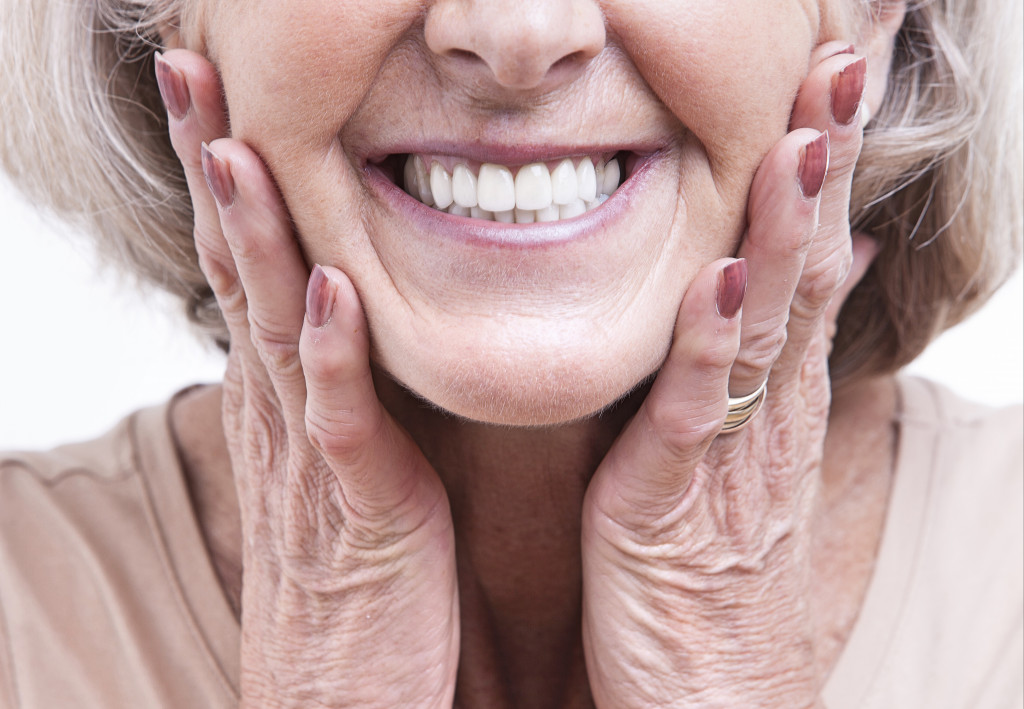- Dental implants are a great way for elderly individuals to prevent gum disease and maintain their oral health.
- Practicing good oral hygiene and visiting the dentist regularly is essential for gum disease prevention in seniors.
- Quitting smoking and using tobacco products is essential for maintaining healthy gums and keeping periodontal disease at bay.
- Eating nutritious foods and staying hydrated are key components of preventing gum disease in the elderly.
Gum disease is a primary concern for elderly adults, as it can lead to tooth loss and other oral health issues. Fortunately, seniors can take some simple steps to prevent gum disease and maintain good oral hygiene.
By following these preventive tips regularly and maintaining good dental care habits over time, elderly adults can help minimize their risk of developing gum disease and enjoy better overall oral health.
Get dental implants.

Dental implants are an excellent way for elderly individuals to prevent gum disease and maintain oral health. Implants are a permanent and strong form of tooth replacement that can keep the gums healthy and ensure no receding or buildup of bacteria in areas where teeth are missing.
Preventing gum disease is essential as it increases the risk of diabetes, stroke, heart attack, pneumonia, rheumatoid arthritis, dementia, and other health issues related to poor oral hygiene. When inserting dental implants in elderly people, the dentist must consider their age-related physical restrictions and medical problems like osteoporosis to ensure the process is safe and effective.
Proper care should also be taken post-procedure so that gums heal properly around the implant, allowing it to provide comfort and function without impacting other parts of the body or general well-being.
Improve your lifestyle.
Improving your lifestyle is also an essential factor in preventing gum disease. Here are some lifestyle changes that can help:
Practice good oral hygiene.
With age, a person’s healthcare requirements can become more complex. For elderly individuals, good oral hygiene is vital to reduce their risk of gum disease. This includes brushing and flossing twice daily to prevent the accumulation of harmful bacteria on the teeth and gums. Regular check-ups with a dentist are also important, as they can advise on proper oral hygiene and spot problems early on before they worsen.
Poor oral hygiene and dental caries in older adults can impair their ability to effectively chew and could cause nutritional deficiencies. Thus, the practice of good oral hygiene is an essential part of managing general health for seniors.
Visit the dentist regularly.

Visiting a dentist regularly is essential for elderly individuals to prevent gum disease. Gum disease is an infection caused by bacteria, such as plaque, that can lead to tooth decay and bad breath if left untreated. The risk of gum disease increases with age due to a decrease in saliva production and changes in oral hygiene habits.
To keep mouths and gums healthy, seniors should see their dentist for regular check-ups every six months or more frequently as needed. During these visits, your dentist can identify potential signs of gum disease before it progresses to more severe levels.
Additionally, your dentist may suggest treatments such as professional teeth cleaning or treatment of plaque and tartar buildup to help your mouth stay healthy. Taking proactive measures like visiting the dentist regularly can dramatically reduce the risk of gum disease in the elderly.
Quit smoking or using tobacco products.
Quitting smoking or using tobacco products is essential for elderly individuals to maintain healthy gums. Periodontal disease, or gum disease, is a progressive condition that results in red, swollen, and bleeding gums and the loss of gum and jawbone tissue when left untreated. As people age, their susceptibility to periodontal diseases increases due to decreased immunity and impaired healing capacities.
Therefore, seniors must take appropriate measures to prevent gum diseases, including quitting smoking or using tobacco products. To do this, consulting a doctor or health professional can provide beneficial advice on how an individual can successfully quit their habit, whether through nicotine replacement therapy patches, speaking with an addiction specialist, or taking up an exercise regime.
Eat nutritious foods.
Eating nutritious foods is essential to maintaining optimal oral health and preventing gum disease in the elderly. A balanced diet rich in whole fresh fruits and vegetables while reducing sugar, fat, and artificial ingredients, is a great way to protect against developing periodontal disease. Reducing sugary snacks can help reduce dental plaque buildup around the gums.
Foods high in calcium, such as dairy products, leafy green vegetables like broccoli and kale, sardines or canned salmon with bones, tofu-based products, and citrus fruits promote strong tooth enamel helps prevent gum recession.
Eating these foods regularly helps to keep your teeth clean and balanced bacteria in the mouth at healthy levels by encouraging good gut flora. It’s important to remember that a varied diet, regular brushing, and flossing will create an ideal environment for healthy gums and teeth in the long run.
Stay hydrated.
Proper hydration of elderly individuals is essential to maintaining overall health and preventing gum disease. Hydration ensures the production of saliva, which helps cleanse the teeth and gums and prevents bacteria growth. Unfortunately, dehydration is a common issue among seniors due to a reduced sense of thirst, health problems, or medications.
Thus, family members must pay close attention to the hydration levels of their elderly loved ones and ensure they are drinking enough water daily. Additionally, seniors should be encouraged to have regular dental checkups to detect any signs of gum disease early on. Taking these steps can go a long way in preserving oral health and reducing the risk of uncomfortable symptoms, including bleeding while brushing or flossing teeth.
These are just a few simple tips to help seniors maintain good oral hygiene and reduce their risk of developing gum disease. With proper preventive steps, elderly adults can enjoy better overall health and ensure they have strong and healthy teeth for years.






